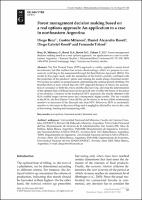Forest management decision making based on a real options approach: An application to a case in northeastern Argentina
Date
2018-04-25Author
Broz, Diego Ricardo
Milanesi, Gastón
Rossit, Daniel Alejandro
Rossit, Diego Gabriel
Tohmé, Fernando Abel
Metadata
Show full item recordAbstract
The Net Present Value (NPV) approach is widely applied to assess forest investments, but this method has serious shortcomings, which we propose to overcome by switching to the assessment through the Real Options Approach (ROA). The model in this paper starts with the simulation of the forest´s growth, combined with the projection of the products´ prices and valuing the assets using a binomial model. We include an option of postponement, determining the optimal period of felling. We find that ROA is more robust than the NPV approach because it relaxes the assumption of constancy of both the prices and the discount rate, allowing the determination of the optimal time of felling based on the growth rate of either the forest or the prices of its products. Contrary to the traditional NPV approach, the results obtained with ROA exhibit longer harvest turns and consequently higher profits. The key variable in the ROA, the Real Option Value (ROV) can be shown to be less (albeit moderately) sensitive to decreases of the discount rate than NPV. Moreover, ROV is moderately sensitive to decreases in the price of logs and is negligibly affected by rises in the costs of harvesting, loading and transporting rolls.
Collections
The following license files are associated with this item:



